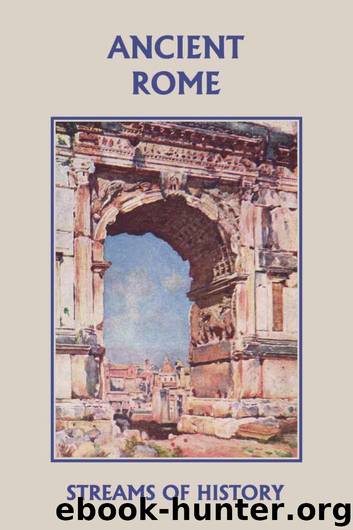Streams of History: Ancient Rome (Yesterday's Classics) by Kemp Ellwood W

Author:Kemp, Ellwood W. [Kemp, Ellwood W.]
Language: eng
Format: epub
Tags: Juvenile Fiction
ISBN: 9781599152561
Publisher: Yesterday's Classics
Published: 2010-11-10T14:56:47.812000+00:00
How Rome Conquered the World, But Destroyed Herself
WHEN Carthage was conquered and destroyed, Rome's struggle for life was over. For five hundred years and more she had been meeting and conquering enemies; and although she was almost always successful, there were many times when it was not certain whether Rome would conquer her enemies, or her enemies Rome.
In this period of five hundred years, Rome had grown from a little village of mud huts and a few hundred people to a great city of fine buildings and streets, and perhaps a half million people. She had grown in size from a little plain on the Tiber no larger than a small township in one of our counties to a great state extending over most of Italy, all of Carthage, and all of the islands of Sicily, Sardinia, and Corsica. She had reached her strong arm over mountains, plains, rivers, valleys and seas, and conquered hundreds of cities with wealth, like herself, and in the mountains scores of tribes who spent their time in wandering from place to place herding cattle and sheep.
But the one most important thing which Rome had done in all this time was this,—she had taken the snarling tribes and quarreling cities of the entire Peninsula and had taught them the lesson of strength in union as the father taught his sons:—after binding a number of sticks together firmly, the father brought the bundle to his seven sons, and offered a reward to the one who could break them. They all tried and failed except the last son. When it came his turn to try, he unbound the bundle, took the sticks singly, and easily broke them all. When the other sons said to the father that they, too, could have broken the sticks by taking them singly, the father replied: "My sons, I have taken this method of teaching you the important lesson that in union there is strength; if you stand together and help one another in life, none can injure you or take from you your possessions; if, on the other hand, you do not unite, but each struggles, selfishly, against the others, you will not only ruin others, but lose your own possessions as well." Of all the nations we have studied—Egypt, Judea, Phoenicia and Greece—not one of them had any such power to bind peoples and nations together and teach them to obey as Rome had. And it was because Rome had taught these many people to obey her, and stand by her, and fight for her, that she had conquered every enemy, and had now, about 150 B.C. conquered the greatest enemy she ever met,—Carthage.
Rome now stood like a young Hercules—master of Italy, Sicily and Carthage, all, as you have seen, about midway in the Mediterranean Sea. If it was desired to conquer Spain in the West it would be easy, for Spain was made up of many tribes who had never been bound together into one strong nation; if it
Download
This site does not store any files on its server. We only index and link to content provided by other sites. Please contact the content providers to delete copyright contents if any and email us, we'll remove relevant links or contents immediately.
The Mayflower and the Pilgrims' New World by Nathaniel Philbrick(4490)
I'm Still Scared by Tomie dePaola(4376)
Bloody Times by James L. Swanson(4363)
Pocahontas by Joseph Bruchac(4247)
Bomb: The Race to Build--And Steal--The World's Most Dangerous Weapon (Newbery Honor Book) by Steve Sheinkin(3934)
Flesh and Blood So Cheap by Albert Marrin(3830)
An American Plague by Jim Murphy(3760)
Little Author in the Big Woods by Yona Zeldis McDonough(3509)
The Giant and How He Humbugged America by Jim Murphy(3434)
Hello, America by Livia Bitton-Jackson(3161)
The President Has Been Shot!": The Assassination of John F. Kennedy by Swanson James L(3088)
Harry Potter: A History of Magic by British Library(3039)
The Landing of the Pilgrims by James Daugherty(2938)
Gettysburg by Iain C. Martin(2829)
The Extraordinary Suzy Wright by Teri Kanefield(2713)
Ben Franklin's Almanac by Candace Fleming(2522)
The Impossible Rescue by Martin W. Sandler(2335)
Bloody Times: The Funeral of Abraham Lincoln and the Manhunt for Jefferson Davis by James L. Swanson(2109)
Who Was Louis Braille? by Margaret Frith(1976)
